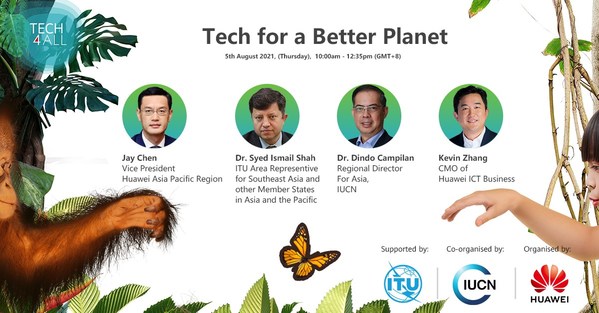Huawei, IUCN join hands to preserve biodiversity in APAC with tech innovations
- Written by PR Newswire
KUALA LUMPUR, Malaysia, Aug. 9, 2021 /PRNewswire/ -- Global leading tech company Huawei and the worlds' largest conservation organization IUCN will join hands on innovative solutions to promote the green transformation and sustainable development in the Asia Pacific region, said representatives at the TECH for a Better Planet Symposium on Aug. 5, 2021.
 Climate change presents a key challenge for social development, driving an urgent need for a low-carbon society & green growth models to protect the environment & promote green economic recovery.
Climate change presents a key challenge for social development, driving an urgent need for a low-carbon society & green growth models to protect the environment & promote green economic recovery.
The symposium, co-organized by IUCN (International Union for Conservation of Nature) and Huawei, and supported by ITU (International Telecommunication Union), brought together industrial experts and opinion leaders from the ICT and environmental protection communities across the Asia Pacific region. This two-part symposium series explored how technology can drive environmental protection and ensure sustainable development.
"The pandemic has transformed our lives, and we must reflect on the relationship between our planet, society and ourselves with a keen eye to the severity of environmental issues," said Jay Chen, Vice President of Huawei Asia Pacific, "Huawei believes that technology will play a critical role, and is committed to contributing more as we move towards a better planet."
The Asia Pacific region is one of the most biodiverse regions in the world. It is home to the world's largest mangrove forest, a global center of marine biodiversity, and has seventeen of the world's 36 "biodiversity hotspots". However, the region is facing many threats including habitat loss, over-exploitation and climate change.
IUCN is now leading a new, open partnership called 'Tech4Nature' together with Huawei. The aim of the partnership is to harness innovative technologies in support of better conservation outcomes in and around protected and conserved areas, according to Dr. Dindo Campilan.
This three-year partnership will pilot a series of innovative digital tools and solutions in 5 countries including Thailand and China.
In partnership with the Thai Department of National Parks, for example, the Tech4Nature program is collaborating with Huawei on its flagship project at the Thailand Khao Yai National Park, a UNESCO World Heritage Site, to explore technological solutions including the use of digital monitor system to navigate wildlife. "IUCN is very pleased to partner with Huawei on Tech4Nature, which is seeking scale-up success nature conservation through digital technology innovations," said Dr. Dindo Campilan, IUCN Regional Director for Asia.
Matt Wilson, Insights Director of Climate Tech at GSMA, emphasized the importance of cross-sector cooperation to combine multiple types of technologies for nature resource management. "When an initiative receives support from a technology organization, mobile operator or an organization like Huawei, it's much more likely to find opportunities to pair technologies and twice as likely to leverage emerging technologies like connected devices, blockchain and IoT. I think this underscores the critical role that the private sector can play in this," Wilson said.
Founded in 2014, Rainforest Connection, a non-profit organization that applies cloud and AI based acoustic solution to help protect the rainforest from illegal logging, has helped protect the world from illegal deforestation and illegal poaching.
"My organization Rainforest Connection is in collaboration with Huawei and some other departments around the world, focusing on trying to protect and also to measure biodiversity," said Topher White, Founder of Rainforest Connection, "Using AI and big data techniques to pull out the ways in which nature itself is speaking to each other is what we can do to ensure measuring biodiversity."
In the Philippines, the Department of Environment and Natural Resources (DENR), PLDT's wireless and mobile operator Smart Communications, Rainforest Connection (RFCx), and Huawei have initiated the Rainforest Guardian system to protect the rainforest.
Powered by solar panels, this system monitors and records sounds of human activity, like chainsaws and vehicles, and captures data on animal behavior patterns.
"One impact of the partnership between Huawei and Smart Communications is that we can use technology and connectivity to monitor protected areas such as mangroves and rainforest," said Melissa Vergel De Dios, First Vice President and Head of Sustainability of PLDT, "By the bioacoustics, the sound of the forest is monitored and recorded to detect illegal logging and poaching activities in the area, so that the local law enforcement and communities can take action quickly."
This system is also being piloted in more areas in countries including Indonesia and Malaysia across the Asia Pacific region. By 2020, Huawei has helped more than 22 protected areas in 18 countries globally manage natural resources and protect biodiversity more efficiently using its digital technologies.
"Technology can help better understand and conserve nature. This is the idea of 'Tech4Nature' we share with IUCN. ICT could be applied to monitor and analyze habitats & biodiversity, improve operational efficiency, better connect the stakeholders of nature conservation," said Kevin Zhang Huawei's Chief Marketing Officer of ICT infrastructure business.
"We appreciate the partnership with technology companies like Huawei to help protect the environment," said DENR-4A Regional Director NILO B. TAMORIA (CESO III) at the Symposium, "We're hoping that we can still improve the technology to make it more effective and efficient as a tool to protect the environment."
Read more https://www.prnasia.com/story/archive/3468776_AE68776_0
